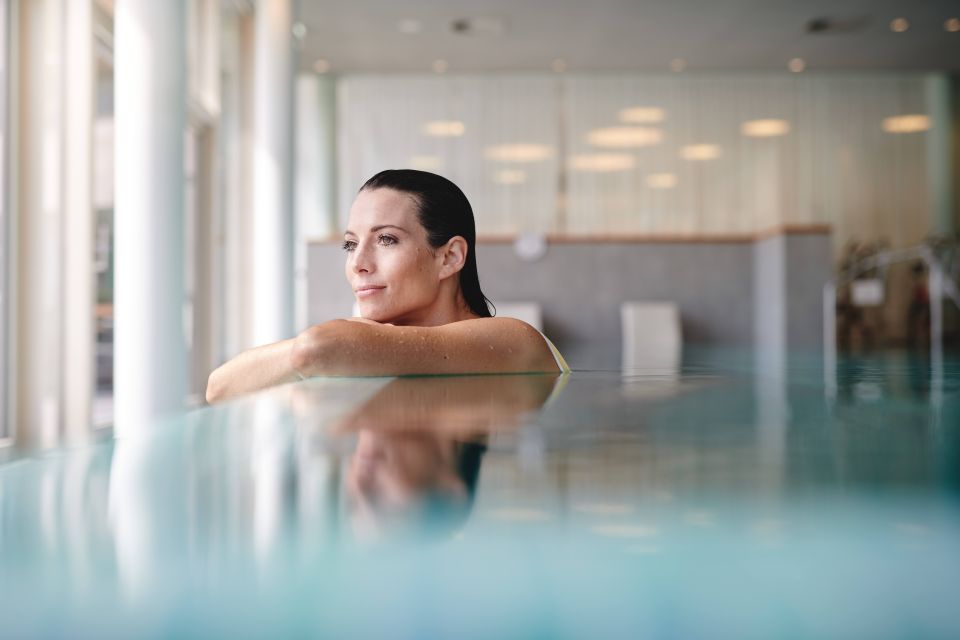Skincare from the inside out
The ideal way to prepare your skin for winter
Skincare is well worth the effort at any time of the year, but especially in winter. Dry air, the cold as well as high temperature differences present a particular challenge during the cold time of year. Find out how you can take care of your skin holistically, how skincare works from the inside out and what a crucial role a healthy gut plays here.

What first comes to mind when you think about skincare? Most likely, you initially envision products for cleansing and nourishing the skin, such as facial toners, creams, liquids & co. Of course you’re right about this, because external skincare is important too. However, holistic skincare always begins inside the body. The outer appearance is a mirror of what’s happening on the inside, and is therefore much more of an effect than a cause. If you are well nourished with nutrients and feel mentally balanced, this will show on the outside and will be reflected in a healthy complexion. If, on the other hand, you are lacking in essential nutrients, this may lead to dry, chapped or flaky skin. Premature formation of wrinkles, dark circles under the eyes or pigment spots are also possible.
To spare you these effects or mitigate any already existing first signs, it is worth taking a close look at your diet and understanding just how important the gut is for radiant skin. If your gut is healthy, external skincare becomes an “add-on” that merely adds the finishing beauty touch to the skin. What’s more, in winter it is especially important to pay particular attention to skincare.
Holistic skincare starts with a healthy diet
If you want to take proper care of your skin, it’s best you start with your diet. In general, make sure to consume plenty of fresh vegetables – even in winter. One thing to keep in mind, however: you should not only source regional, seasonal food, but also aim to opt primarily for alkaline foods. These include, among others: leafy lettuces, fennel, red bell pepper, broccoli, celery, kohlrabi, carrots, parsnips, pumpkin, zucchini, asparagus, spinach, tomato, potato and sweet potato, red beet, Jerusalem artichoke and eggplant. In the MAYRLIFE cookbook “Veggie Stars”, we’ve compiled a whole host of beneficial and delicious recipes for you. This skincare from the inside should represent the foundation of your nutrition not only in winter, but all year round. However, it’s clearly not always possible to stick to alkaline-based food in everyday life.
These vitamins nourish your skin from the inside out
- Vitamin A: for vitamin A, it’s all about taking its precursor in the form of beta-carotene, also known as provitamin A, rather than vitamin A itself. This is because beta-carotene is converted into vitamin A in the body. It is responsible for the division and renewal of cells and therefore of great importance for skin health. It promotes the development of collagen fibers, keeping skin supple and smooth. Moreover, this vitamin acts as a scavenger of free radicals, effectively preventing premature skin aging and wrinkles. Foods that are especially easy to find regionally in the fall and that are rich in provitamin A include carrots, spinach and broccoli.
- B vitamins: there are eight B vitamins in total, and they all play a vital role for our health. The following B vitamins are particularly important for your skin:
- Vitamin B2 (riboflavin): regenerates and firms skin; can be found in abundant quantities in wholegrain products, cereal germ, Atlantic pollock and dairy products.
- Vitamin B3 (niacinamide): regulates the skin’s moisture balance and is involved in the formation of collagen and pigment; found in fish, poultry and mushrooms.
- Vitamin B5 (pantothenic acid): promotes the healing of wounds and accelerates cell growth; contained in wholegrain products, peas, fish, pulses, mushrooms and nuts.
- Vitamin B6: supports the development of skin tissue; present in ample amounts in kale, spices, avocado and chives.
- Vitamin B7 (biotin, vitamin H): is necessary for the production of skin, hair and nails, protects against inflammation of the skin and ensures a healthy, fresh complexion; found especially in oats, wheat germ, nuts, beans, cauliflower and eggs.
- Vitamin B9 (folic acid): important for cell division and a healthy nervous system; algae, nuts, bean sprouts, lentils, spinach, broccoli, asparagus and white cabbage are rich in this vitamin.
- Vitamin C: strengthens connective tissue and promotes the production of collagen. The latter ensures that the skin and connective tissue remain elastic and taut. Foods rich in vitamin C are citrus fruits (although beware: acidifying!), bell peppers, leeks and acerola cherries.
- Vitamin D: this hormone precursor not only improves the absorption of calcium, magnesium and phosphorus in the body, but also promotes the production of feel-good hormones, which has a positive effect on the complexion. The feel-good hormone serotonin is largely made in the gut. This is the first hint of the connection between a healthy gut and a healthy complexion. Good sources of vitamin D include herring, salmon, egg yolks, avocado, porcini mushrooms and sunlight. This is because our skin is able to produce vitamin D with the help of sunlight.
- Vitamin E: vitamin E acts as a free radical scavenger in the body and promotes the growth and shine of the hair. It ensures healthy skin cells and keeps the skin elastic. Wheat germ oil, sunflower oil and olive oil are especially rich in vitamin E.

Skincare from the inside out with these minerals and trace elements
When it comes to holistic skincare, there’s no getting around minerals and trace elements. These support numerous metabolic processes and bodily functions. The following micronutrients in particular are of great importance for the care and health of the skin. If skin is well-supplied with these nutrients, it will be able to better withstand the stresses of fall and winter.
- Sodium and potassium: these regulate the water levels of the cells, and therefore also the moisture content of the skin. Sodium is to be found in particular in unprocessed salts. Foods rich in potassium are dried fruits, bananas, spinach, broccoli, asparagus and pumpkin. The latter is readily available regionally in the colder time of year, and generally keeps for a long time. Hokkaido pumpkins, for example, are also rich in vitamin C and beta-carotene and thus represent a true superfood for the skin. For long-lasting skincare from the inside out, it should form a regular part of your diet in winter.
- Iron: in relation to the skin, iron is important for the supply of oxygen. This is particularly evident in a rosy, fresh skin tone. Alongside red meat, iron can be found in abundant amounts in sesame, pistachios, cashew nuts, chanterelle mushrooms, oats, beans and lentils.
- Magnesium: has an anti-allergic and anti-inflammatory effect in the skin cells. Recommended sources of magnesium are broccoli, brown rice, pulses, nuts, potatoes and sunflower seeds. They are highly recommended to help prepare the skin for the winter, as they also contain large quantities of other important minerals, trace elements and even – as is the case with nuts – omega-3 fatty acids. These strengthen the cell membranes in the skin cells, thereby ensuring firm, supple skin. Hemp oil, linseed oil and camelina oil are rich in omega-3 fatty acids. You can drizzle a tablespoon of one of these oils over your serving of vegetables or your porridge and give your meal a great nutritional boost.
- Copper, zinc and selenium: while copper encourages the formation of melanin, elastin and collagen, zinc plays a crucial role in the development of the horny layer of the skin. It promotes healing from wounds and protects the cells. Selenium ensures elastic skin and connective tissue, among other functions.
Holistic skincare must start in the gut
If you suffer from skin problems (allergies, neurodermatitis, psoriasis, acne etc.), the gut is almost always involved. Because only when a healthy gut flora is present can the nutrients be optimally absorbed into the body. If this mechanism is impaired, this frequently shows up in the form of skin irritations. The reason is leaky gut syndrome. This is also known as “increased intestinal permeability” and describes the fact that the connecting points between the intestinal epithelial cells (“tight junctions”) are defective. As a result, the path is free not just for nutrients, but also for harmful substances to enter the body. This can mess up the entire metabolism and can also manifest itself in skin issues.
To bring the function of the gut back into balance, holistic colon cleansing is worthwhile, just like the treatment carried out at MAYRLIFE. This not only relieves the strain on the gut, cleanses it and rebuilds it with alkaline food, but also takes the connection between the gut and the mind into account. As part of the MAYRLIFE programs, in addition to healthy nutrition, relaxation methods are also practiced and trained so that these can then be implemented at home too. Relaxation techniques work via the vagus nerve to have a calming effect on the digestive organs and thus play a demonstrable role in gut health.
Don’t yet know which program is right for you? Ask our team – we’ll be happy to advise you!
Recommendations
from the magazine
Awarded 'Best Medical Spa Worldwide'

World Luxury Spa Award 2023
World’s Best Luxury Medical Spa

Seven Stars Luxury Hospitality and Lifestyle Awards 2022
Best Medical Wellness & Longevity Resort

Condé Nast Readers’ Choice Awards 2022
Best Destination Spa

European Health & Spa Award 2024
Best Medical Resort

Haute Grandeur Global Awards 2024
Best Medical Spa in Europe


